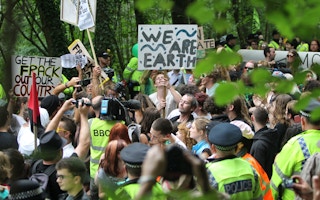Arriving at the beautiful village of Balcombe last August, ready to take part in the growing protests against Cuadrilla’s plans to start fracking deep in the Sussex countryside in southern England, my biggest concern – as I weaved my way through families with children and dogs, stepping over people picnicking on rugs on the grass verge − was whether we’d escape without rain.
I have to confess that looking out for Russian spies was not high on my list of preoccupations. Yet if Anders Fogh Rasmussen, the NATO Secretary General, is to be believed, perhaps it should have been.
Stunned audience
Speaking at a Chatham House conference in London last week, Rasmussen stunned his audience by asserting that Vladimir Putin’s Russian government was behind attempts to undermine projects using hydraulic fracturing technology in Europe.
He said: “… I have met allies who can report that Russia, as part of their sophisticated information and disinformation operations, engages actively with so-called non-governmental organisations, environmental organisations working against shale gas – obviously to maintain European dependence on imported Russian gas. That’s my interpretation.”
“
It besmirches the motivations of many thousands of sincere protesters who campaign in good faith against a technology that causes serious pollution to water, soil and air, and which will lock us into ever greater fossil fuel dependence at precisely the time when climate scientists are warning that we urgently need to invest in renewables instead
This is a pretty mind-boggling assertion − and it is one for which absolutely no evidence at all was adduced.
If this had been the “interpretation” of a fellow Balcombe protester who had turned to their homemade cider a shade early on in the proceedings, it would simply be odd. But the fact that these are the views of the man in charge of the biggest nuclear alliance on Earth is positively terrifying.
The allegation is, quite simply, ludicrous. I’ve met a good many anti-fracking campaigners over the years, and I have never heard anything so absurd. Indeed, Greenpeace gave the proposition admirably short shrift, saying: “The idea that we’re puppets of Putin is so preposterous that you have to wonder what they’re smoking over at NATO HQ.”
Quite. But Rasmussen’s assertion is also deeply worrying.
First, it besmirches the motivations of many thousands of sincere protesters who campaign in good faith against a technology that causes serious pollution to water, soil and air, and which will lock us into ever greater fossil fuel dependence at precisely the time when climate scientists are warning that we urgently need to invest in renewables instead.
It is a technology, moreover, that will not deliver the much-vaunted European energy independence claimed for it, since even under the most optimistic scenarios, shale gas is projected to meet just 10 per cent of European gas demand by 2030. Most commentators agree that 2 per cent - 3 per cent is a more realistic estimate (International Energy Agency: World Energy Outlook 2012). Even in the best case scenario, the volumes of EU shale gas will be too small to impact meaningfully on EU security of supply concerns.
Second, it raises serious questions about the judgment of one of the most powerful men in the world. The head of NATO must be dangerously deluded if he genuinely believes his own rhetoric. And if his assessment is in such serious doubt over this, on how many other issues is his judgment falling short?
Growing campaigns
Perhaps one thing this episode does show, however, is how effective the growing anti-fracking campaigns are becoming, and therefore how much of a threat they pose to those shale gas enthusiasts who still believe − flying in the face of the evidence − that it will offer a low-cost, low-carbon energy future. Fracking is already banned in five of the 14 EU Member States with estimated reserves − including in France, which has the second largest resources after Poland.
The reality is that one doesn’t need to fantasise about possible Russian attempts to discredit fracking. The evidence is doing that very effectively on its own. The bigger conundrum is why, in a country with such plentiful renewable resources as the UK, we have a government intent on locking us into yet more fossil fuel dependence.
Judging by the bewildering lack of ministerial commitment in the UK to cheaper, more plentiful renewables − which, alongside a serious investment in efficiency and conservation, really could deliver energy independence − perhaps we should check whether the Russians have infiltrated the Department for Energy and Climate Change as well. If so, they seem to have been remarkably effective.
Caroline Lucas, the UK’s only Green Party Member of Parliament, was arrested at a protest against fracking in southern England last year. She was found not guilty of the charges the police brought against her – for wilful obstruction of a public highway and breaching an order under section 14 of the Public Order Act (relating to public assemblies). This post originally appeared in Climate News Network.

















